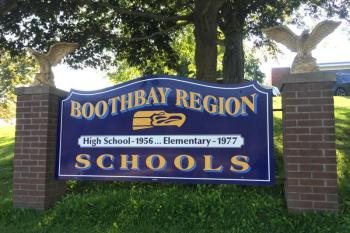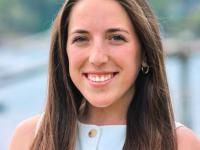Transgender policy draws attention at school committee meeting
An unusually large crowd came to the Community School District (CSD) School Committee meeting March 11. In response to posts on social media, many residents showed up to discuss the district’s policy on transgender students. Although no board action was taken, it appears to be the first of several discussions on the issue.
During a standard review of policies for second read and adoption, the board approved policies around employee use of electronic devices, social media and artificial intelligence. Committee member Stephanie Hawke added she would like to revise another policy: ACAAA, Transgender and Gender Expansive Students, which was adopted in 2019.
ACAAA states its purpose is to foster “a learning environment that is safe, affirming, and free from discrimination, harassment and bullying for all students” and “assist in the educational and social integration and development of transgender and gender expansive students in our schools.”
Hawke did not specify her proposed changes but said she is working with the district to present them at the next meeting. The revisions would be presented as a first read with an opportunity for public review. According to the chair, the board cannot review proposed changes until they are in writing. Board members also discussed presenting other revisions, separate from Hawke's.
During public comment, Lacey Phelps, a guidance counselor at the elementary school, claimed many people came to the meeting in response to a social media post. March 10, CSD Trustee Darrell Gudroe posted on Facebook asking if medical procedures for students under the school's care should be allowed without notifying parents or guardians. Gudroe said the question is intentionally broad, and referred to incidents including vaccines, broken arms and gender changes. By the time of this story’s publication, the post had 243 comments and included a link to policy ACAAA. Most commenters answered “no.”
However, Phelps said the post included false information alluding to surgeries, and added that misinformation is dangerous. “Trustee members and school board members are supposed to be looking out for our students and our buildings, all students, absolutely 100% no matter how they identify,” she said.
Gudroe responded at the March 12 trustees' meeting. He said he wanted the post to be a broad conversation, but his original may have been misinterpreted. “I did not mean to misrepresent or to cause a lot of alarm, but I do love that people cared and came last night,” he said.
Gudroe said he is primarily concerned about how ACAAA addresses parental knowledge. “My intent, if anything had to be changed, would be to take out that parents have no knowledge.”
In its privacy and confidentiality section, the policy states student records shall be kept confidential in accordance with applicable privacy laws. “School staff shall comply with the student’s wishes regarding disclosure of their transgender status to others, including but not limited to parents or guardians, students, volunteers or other school staff, unless the student has explicitly authorized the disclosure or unless legally required to do so,” it reads.
There is no language in ACAAA mentioning medical procedures being performed. The policy states it is intended to be interpreted considering federal and state laws and regulations, with its legal reference to the Maine Human Rights Act, 20-A MRSA § 4601.
At the school committee meeting, high school social worker Tammy Blackman said the policy is intended to keep kids safe. “Ultimately, our job is to make sure every student feels safe, every student has a place to be themselves and to be supported.”
Fourteen-year-old Scout Martin, who is nonbinary, said it is important that every child is safe whether at home, school, or their extracurricular activities.
“Whether that is being in a safe space physically or in a safe space mentally, it is very important that we support those kids who weren't assigned the right gender at birth,” Martin said. “Most of them have struggled to figure out who they really are or to get people to use their real name. It's very important we protect that and make sure that we are showing that we are in a safe space for all kids regardless of race, gender identity, sexuality and all others.”
Blackman also said the feeling of safety has real-world implications. She said school trainings connected to student support and suicide prevention. According to the Trevor Project, a non-profit suicide prevention organization for LGBTQ+ (lesbian, gay, bisexual, transgender, queer, and questioning) youth, suicide is in the top three leading causes of death among people aged 10 to 24. The organization says LGBTQ+ young people are over four times as likely to attempt suicide than their peers, and 41% of LGBTQ+ young people seriously considered attempting suicide in the past year, including roughly half of transgender and nonbinary youth.
“Every time we have a child that feels supported, it is suicide prevention,” Blackman said. “This policy, as it is currently written, does that. It does not need to be changed.”





























